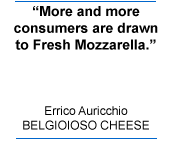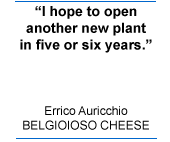 |
|||


|
 |


|
|

April 11, 2008 |
|||
| BelGioioso opens new plant, continues to expand specialty cheese production | |||
By Kate Sander DENMARK, Wis. — With its presence in the specialty cheese market rapidly growing, last spring BelGioioso Cheese Inc. did the only thing it could do: It broke ground to build a fifth cheese plant to keep up with demand. The Denmark, Wis.-based Italian cheese company that started from humble beginnings nearly 30 years ago crafting Provolone with 15 employees now has 350 employees and is celebrating the operation of its newest plant in nearby Freedom, Wis. The new plant, which began making cheese in December, held its grand opening late last month and is making three cheeses: Fresh Mozzarella, Fontina and Crescenza. The company chose to build the new 90,000-square-foot plant in an open field instead of acquiring and remodeling an older plant because many times older plants are difficult to adapt, says Errico Auricchio, company president, who founded BelGioioso Cheese in 1979 after moving from Italy to Wisconsin. He is pleased with the result, saying the Freedom plant is state-of-the-art. The location is ideal, too. All five of the company’s cheese-producing plants are in the vicinity of Green Bay, allowing the company to be near the 200 area dairy farms from which it sources milk. Plus it is, after all, Wisconsin. Auricchio believes that with its high-quality milk and strong dairy infrastructure, Wisconsin is the ideal place for making cheese, and he is proud that his cheese bears a Wisconsin label. The new plant will allow the company to continue expanding the market for its Fresh Mozzarella, which currently is the company’s fastest-growing cheese. Fresh Mozzarella already is a well-known cheese, Auricchio says, noting that it’s easy for “More and more consumers are drawn to Fresh Mozzarella,” he adds. To meet customer demand for the cheese, the company in the last two years has made it available in a couple of new forms: First, there’s BelGioioso Pearls, snack-sized balls of Fresh Mozzarella in retail 8-ounce cups and 1-pound thermoform pouches and 3-pound foodservice tubs, and then there is pre-sliced Fresh Mozzarella in 1- and 2-pound logs. BelGioioso also has been adding new varieties and packaging options to its line up of cheeses. In late 2006, the company launched a rare Italian delicacy, Burrata. Silky on the outside and creamy on the inside, Burrata boasts a richly sweet, milky flavor.? This made-to-order cheese is hand-formed into 4- or 8-ounce balls and packaged in water for an extended shelf life. The cheese won second place in its class at last year’s American Cheese Society competition. The company also has introduced Crescenza-Stracchino, a fresh, rindless cheese made from whole pasteurized cow’s milk. The company describes this cheese, which originated in the Lombardy and Romagna regions of Italy, as having a texture that is soft and creamy with a uniform consistency. Spreading and melting easily, the cheese has a mild, milky flavor with a hint of tartness. This past year, the company — which continually focuses on making cheese convenient for the retail consumer — updated its packaging for its sliced cheeses. The cheeses now are available in easy-open packaging from Curwood Inc., with tear-tape packaging replaced by an ItegraScore opening. The new packaging is designed to offer a more consistent and reliable means of opening. BelGioioso also has launched a new 5-ounce cup of its shredded American Grana, and the company’s sharp Provolone is doing well, with new packaging and forms sparking interest in the cheese. BelGioioso is the only U.S. company that offers sliced sharp Provolone in retail packages.
“Aging is very important for many cheeses like Provolone and Parmesan,” he says. Attesting to that quality, the company’s Parmesan placed third in its class at the World Championship Cheese Contest this spring. The company also placed third in the open soft cheeses class with its Crema di Mascarpone. BelGioioso ages its cheese in its own climate-controlled facility with more than 100,000 square feet of space. “Time makes the difference,” Auricchio says, noting that some companies try to rush the process with different make procedures and ingredients. Auricchio doesn’t believe in that. “It’s a very delicate process, but it’s worth the time and effort,” he says. “We check the cheese by hand and clean the cheese like they do in Europe. “All that we do is geared toward quality,” Auricchio adds. “We try our best to make good cheeses. We don’t follow trends. We’re very traditional with what we do.” Being from Italy and producing Italian cheese, Auricchio probably has had to weather more than his fair share of questions about comparisons between cheese made in Italy and cheese made in the United States. A diplomat, Auricchio says that there are incredible cheeses made in both countries. They are different from one another, but that doesn’t necessarily make one better than the other. Sometimes it just comes down to status — until recent years, imported cheeses often were considered to have a higher status than domestic cheeses. He likens it to a BMW vs. a Honda, both cars do the same thing but one has a higher perceived status. However, blind tastings have shown that many U.S. cheeses are perceived as being as good as or better than their European counterparts. The surge of interest in specialty U.S. cheeses has helped knock away some of the misperceptions. “Chefs are using more American cheeses, and consumers will learn from that,” he adds. Overall, interest in the company’s cheese is growing domestically, Auricchio notes, saying that the while much of its cheese is sold on the East and West Coasts, the Midwest and South have grown as markets as well. The weak U.S. dollar is having more than one effect, too. Not only is the company looking more seriously at expanding its current export market beyond Mexico and the Caribbean, Auricchio says the weak dollar also will help knock out the lower-quality imports from the U.S. market. Of course, market conditions have their downsides as well. With the high price of milk and the strong possibility of a recession, dairy companies across the board will have to continue to be very careful about their bottom lines. There is some concern that specialty cheeses will experience more of the brunt of a weak economy because of their luxury status. “We’ll have to watch carefully to see how consumers are spending their money,” Auricchio says, “and continue to be sure we’re providing a good value for the consumer. “There’s a lot of competition out there,” he adds. “You have to be consistent and believe in what you’re doing.” With that focus on quality and consistency in place, Auricchio plans for the company to continue growing. Five years ago, BelGioioso completed a new manufacturing facility adjacent to its corporate office and plant in Denmark, Wis. Now it has the new Freedom plant. “I hope to open another new plant in five or six years,” he says. However, the company will not sacrifice quality for growth. “We were unknown 15 years ago; now we’re more known, more respected,” Auricchio says, noting it’s the company’s commitment to quality that has helped it get to where it is today. “Our dream is to stay independent,” he says, an offhand reference to many of the acquisitions that have taken place in the Wisconsin and national cheese industries during the course of the past decade. “Nobody can do justice to the quality like we can.” CMN
|
|||
| CMN article search |
|
|
© 2025 Cheese Market News • Quarne Publishing, LLC • Legal Information • Online Privacy Policy • Terms and Conditions
Cheese Market News • Business/Advertising Office: P.O. Box 628254 • Middleton, WI 53562 • 608/831-6002
Cheese Market News • Editorial Office: 5315 Wall Street, Suite 100 • Madison, WI 53718 • 608/288-9090


 chefs to prepare it for use in salads and that it’s a light cheese, which is in vogue right now.
chefs to prepare it for use in salads and that it’s a light cheese, which is in vogue right now. One of the reasons the company’s sharp Provolone and other cheeses taste so good is because of the time and attention that goes into aging them, Auricchio says.
One of the reasons the company’s sharp Provolone and other cheeses taste so good is because of the time and attention that goes into aging them, Auricchio says. “This has been the trend, and it will continue.”
“This has been the trend, and it will continue.”